multivitamin support
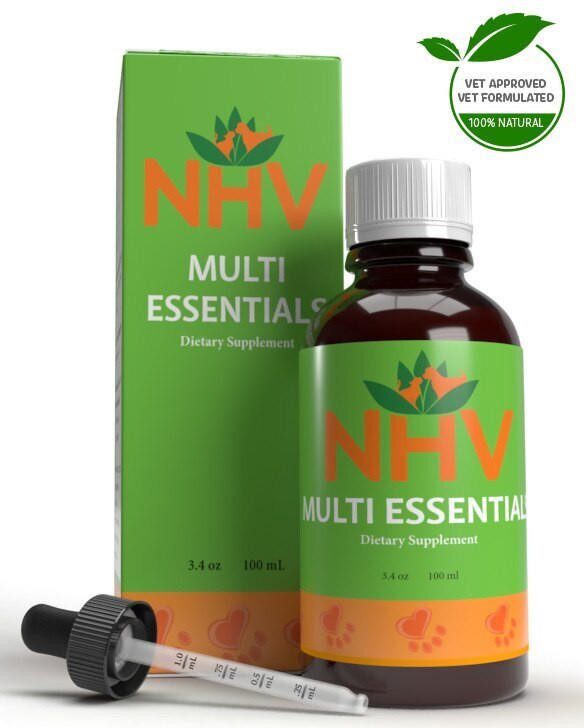
free shipping over $100 (USA & Canada)
1-877-937-4372 the pet expert hotline
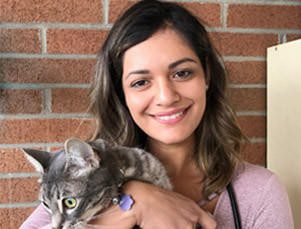

As a loving pet pawrent looking for natural ways to support your little one’s health, you may be wondering, “what are holistic vets, and how are they different from regular vets?” This alternative veterinary approach can complement the work of animal behaviorists, to vet dentists and oncologists for pets. Our vet team is here to explain the integrative wellness method that guides NHV!
The conventional approach to illness is to get rid of a particular disease pattern or symptom using prescribed medication and/or surgery. In contrast, a holistic approach sees a symptom as a clue to a larger problem and develops treatment plans to support the whole body rather than focusing on symptoms.
Conventional vets, a.k.a. ‘regular’ vets, complete a diploma in veterinary medicine to earn a Doctor of Veterinary Medicine (DVM). They are trained in prescribing medication and surgery but usually don’t receive training in nutrition or holistic care. These certified vets can work as companion animal veterinarians, or complete additional training to act in a more specific field.
Holistic vets have completed conventional training, earned a DVM, and are trained in alternative (or complementary) therapies for a specific pet. They combine methods from traditional medicine and holistic medicine to build an integrative care plan that considers the whole picture of a pet. They only resort to prescription medication and surgery when necessary.
Holistic vets not only care about a pet’s medical history, but they are also concerned about a furkiddo’s environment, genetics, nutrition, family relationships, stress levels, and other factors when creating a treatment plan.
Once an animal specialist obtains a DVM, they can either continue studying to pursue an advanced specialty or pursue studies in a different healing modality to offer pet patients a greater range of treatments.
Companion Animal Veterinarians
These are the most common types of veterinarians and are the ones you would most likely interact with as a pet parent. These vets are like the equivalent of human primary care physicians.
Veterinary Specialists
Like in human medicine, veterinary physicians can be specialists in many different areas. The American Veterinary Medical Association (AVMA) recognizes more than twenty different kinds of veterinarians, which include: anesthesiology, dentistry, pathology, and surgery. Veterinarians can also specialize in a particular species or group of animals, like exotics, cats, dogs, pocket pets, poultry, or wildlife.
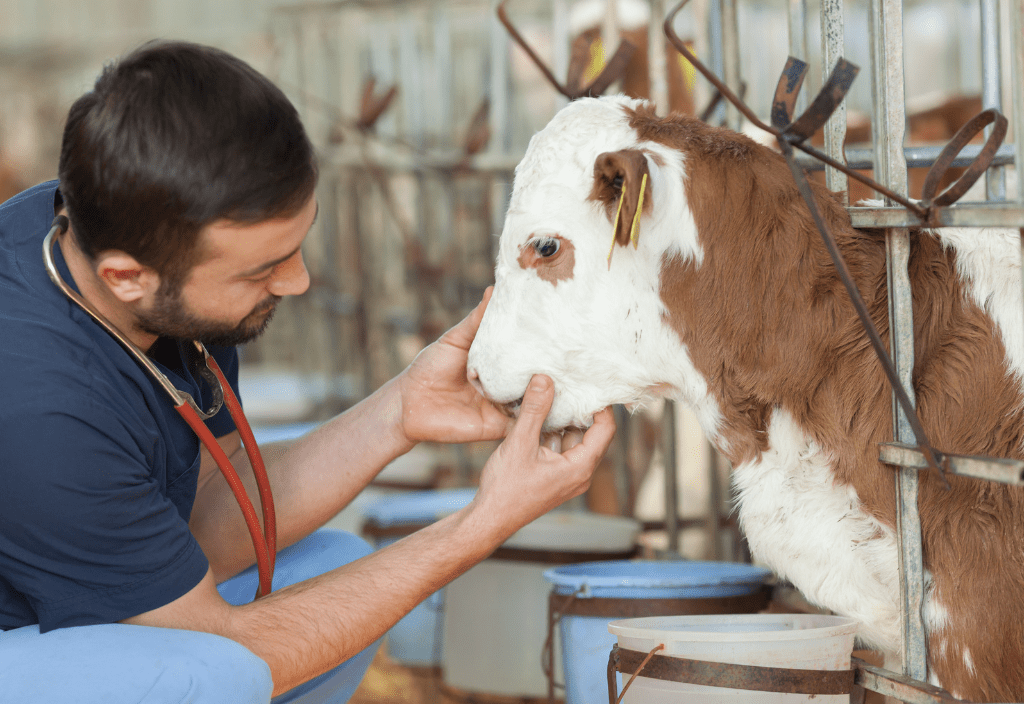
Livestock, Food, and Large Animal Veterinarians
Food animal veterinarians mainly work with animals raised for human consumption to ensure products are safe to eat. Many are large animal vets, but that is not always true. These vets help ensure food animals’ welfare and work to help prevent or control disease outbreaks. They often travel a fair bit and may work in ranches or farms.
Food Safety and Inspection Veterinarians
These vets often work in organizations like the US Food and Drug Administration’s Inspection Service to help enforce laws and regulations. These types of veterinarians may inspect animal products like eggs, dairy, and meat, to ensure animal welfare and sanitary practices. In some cases, they might need to isolate infected animals or test the safety of certain medicines.
Research Veterinarians
Vets that conduct research often pursue graduate-level or doctoral-level studies. These types of vets often work in a biomedical research lab or maybe as faculty members in a university. Our senior vet, Dr. Amanda (DVM, MVSc, PhD) is the head of research at NHV Pet Products. Working with leading universities and veterinary hospitals, she has conducted clinical trials on several NHV products. Here is a link to our latest clinical research. Dr. Amanda also teaches vet students at Western College of Veterinary Medicine (U of Saskatchewan).
Dr. Amanda is also specialized in vet nutrition and can build a personalized diet for your little one with all their health needs in mind. You can always count on our vet team if you ever need us. We are just a message away. Ask away about holistic support and how we can work alongside your local vet to help your little one live longer naturally!
multivitamin support

Herbal Digestive Aid, Energy Booster, and Multivitamin for Cats
buy 2 and save $3
3 month supply for a small to medium size pet
These multivitamins for cats will ensure your kitty (of any age) is getting an extra dose of minerals and vitamins for extra energy, vitality, and health.

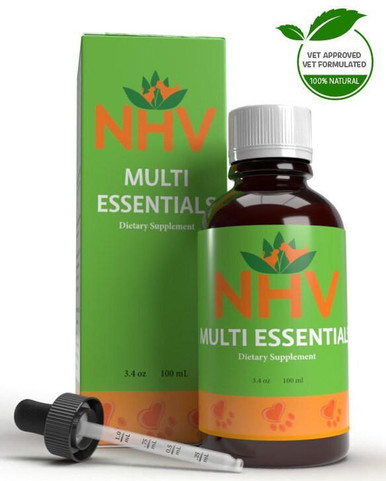
These multivitamins for cats will ensure your kitty (of any age) is getting an extra dose of minerals and vitamins for extra energy, vitality, and health.

The health benefits of multivitamins aren’t just for humans. Cats have many of the same nutrient needs as we do, and some need even more than others depending on their age and health.
A multivitamin supplies the vital nutrients your kitty needs to be healthy and to fight off potential health problems. Dr. Cook, DVM, CVA in her blog states that vitamins “help to regulate the body processes, protect the body from environmental toxins, and break down nutrients such as carbohydrates, proteins, and fats so the body can utilize them”.
The best way to give your cat vitamins and minerals are from whole food sources and not just isolated synthetic vitamins. NHV Multi Essentials contains a powerful blend of alfalfa, oat, dandelion, kelp, parsley, marshmallow, chickweed, stinging nettle, Asian ginseng, yucca and Oregon grape.
Health Benefits of NHV’s Multi-Essentials for Cats
With NHV’s multi vitamins for cats, you get a proprietary blend of all-natural ingredients that are organically grown and contain no artificial additives, preservatives, or coloring. Some of the health benefits include:
Multivitamins for cats will ensure your kitty is getting the proper nutrients that could be lacking due to daily stressors, a poor diet, and environmental toxins.
Signs of Vitamin Deficiency in Your Cat
Kitties Who’ve Benefited from NHV Multi Essentials
NHV multi vitamin for cats has helped thousands of pets around the world. Here are just a few of their stories:
DEALING WITH DIGESTIVE ISSUES: MICI THE CAT LOVES HIS VITAMINS NHV MULTI ESSENTIALS
HERBAL MULTIVITAMINS AND TURMERIC HELP CATS, OATMEAL AND MELISSA LIVE HAPPIER
CAN CATS WITH FELV LIVE A HEALTHY AND NORMAL LIFE?
If you have questions regarding holistic support including vitamin supplements for cats, ask an NHV expert because, at NHV, we want your cat to feel clawtastic naturally!
Select your pet's weight to determine the correct dose.
To be taken twice daily. Determine your pet’s weight and then use the easy chart below to determine the correct dose. This is the minimum dosage.
Pet's Weight Dosage
0 - 15 lb = 0.5 ml
16 - 30 lb = 1.0 ml
31 - 45 lb = 1.5 ml
46 - 60 lb = 2.0 ml
61 - 75 lb = 2.5 ml
Over 75 lb = 3.0 ml
How to Administer
Shake well before use. The easiest method is to use the dropper provide and places the drops into your pet’s food or favorite treat. You can also use the dropper and squirt directly into the pet’s mouth.
Some pets can be finicky, if this occurs consider hiding the drops in foods most pet’s love such as fish, chicken or yogurt or a favorite treat. If your pet only eats dry food then soak a few kibbles at feeding time.
For Best Results
Herbal dietary supplements are beneficial to the health and wellbeing of your pet and are safe for long-term use. Every pet responds to natural herbal supplements differently, therefore it is important to be consistent and administer the product daily. Supplements generally take two to four weeks to take effect, however this will vary from one animal to the next.
Product Storage
All NHV Natural Pet Products are pure herbal extracts and contain no artificial additives, preservatives or coloring. Shelf life after opening is 6 months and must be refrigerated after opening.
Cautions and Contraindications
Do not use Multi Essentials in pregnant or nursing animals. Speak to your vet before using our products. A second visit is recommended if your pet’s condition does not improve, or deteriorates after continued use of the supplements.
All information provided by NHV Natural Pet Products is for educational purposes only.
The health benefits of multivitamins aren’t just for humans. Cats have many of the same nutrient needs as we do, and some need even more than others depending on their age and health.
A multivitamin supplies the vital nutrients your kitty needs to be healthy and to fight off potential health problems. Dr. Cook, DVM, CVA in her blog states that vitamins “help to regulate the body processes, protect the body from environmental toxins, and break down nutrients such as carbohydrates, proteins, and fats so the body can utilize them”.
The best way to give your cat vitamins and minerals are from whole food sources and not just isolated synthetic vitamins. NHV Multi Essentials contains a powerful blend of alfalfa, oat, dandelion, kelp, parsley, marshmallow, chickweed, stinging nettle, Asian ginseng, yucca and Oregon grape.
Health Benefits of NHV’s Multi-Essentials for Cats
With NHV’s multi vitamins for cats, you get a proprietary blend of all-natural ingredients that are organically grown and contain no artificial additives, preservatives, or coloring. Some of the health benefits include:
Multivitamins for cats will ensure your kitty is getting the proper nutrients that could be lacking due to daily stressors, a poor diet, and environmental toxins.
Signs of Vitamin Deficiency in Your Cat
Kitties Who’ve Benefited from NHV Multi Essentials
NHV multi vitamin for cats has helped thousands of pets around the world. Here are just a few of their stories:
DEALING WITH DIGESTIVE ISSUES: MICI THE CAT LOVES HIS VITAMINS NHV MULTI ESSENTIALS
HERBAL MULTIVITAMINS AND TURMERIC HELP CATS, OATMEAL AND MELISSA LIVE HAPPIER
CAN CATS WITH FELV LIVE A HEALTHY AND NORMAL LIFE?
If you have questions regarding holistic support including vitamin supplements for cats, ask an NHV expert because, at NHV, we want your cat to feel clawtastic naturally!
Select your pet's weight to determine the correct dose.
To be taken twice daily. Determine your pet’s weight and then use the easy chart below to determine the correct dose. This is the minimum dosage.
Pet's Weight Dosage
0 - 15 lb = 0.5 ml
16 - 30 lb = 1.0 ml
31 - 45 lb = 1.5 ml
46 - 60 lb = 2.0 ml
61 - 75 lb = 2.5 ml
Over 75 lb = 3.0 ml
How to Administer
Shake well before use. The easiest method is to use the dropper provide and places the drops into your pet’s food or favorite treat. You can also use the dropper and squirt directly into the pet’s mouth.
Some pets can be finicky, if this occurs consider hiding the drops in foods most pet’s love such as fish, chicken or yogurt or a favorite treat. If your pet only eats dry food then soak a few kibbles at feeding time.
For Best Results
Herbal dietary supplements are beneficial to the health and wellbeing of your pet and are safe for long-term use. Every pet responds to natural herbal supplements differently, therefore it is important to be consistent and administer the product daily. Supplements generally take two to four weeks to take effect, however this will vary from one animal to the next.
Product Storage
All NHV Natural Pet Products are pure herbal extracts and contain no artificial additives, preservatives or coloring. Shelf life after opening is 6 months and must be refrigerated after opening.
Cautions and Contraindications
Do not use Multi Essentials in pregnant or nursing animals. Speak to your vet before using our products. A second visit is recommended if your pet’s condition does not improve, or deteriorates after continued use of the supplements.
All information provided by NHV Natural Pet Products is for educational purposes only.
general wellbeing

Holistic Daily Pet Vitamins for Cats and Dogs
bundle and save with pet expert kits
3 month supply for a small to medium size pet
Vitamins and minerals are essential to life - they help your dog or cat with their overall health and vitality by regulating the metabolism and supporting many other biochemical processes across the body.


Vitamins and minerals are essential to life - they help your dog or cat with their overall health and vitality by regulating the metabolism and supporting many other biochemical processes across the body.

Daily Nutritional Support for Pets
Without vitamins and minerals, your furkiddo may develop nutritional deficiencies that disrupt normal body functioning and can lead to chronic injury or illness. You may be wondering why your pet would benefit from daily dog vitamins or natural cat vitamins if they are getting everything they need from their food. Most commercial pet foods try their best to meet the minimum recommendations for vitamins and minerals set by regulating organizations like the AAFCO. However, things to keep in mind are:
Like humans, vitamins and minerals in our furbaby’s body work together synergistically rather than function as isolated chemicals. When we single out a vitamin, we may lose the balance that nature provides with interdependent co-factors (helper molecules) like trace minerals or phytochemicals. The best way for your pet to get the vitamins and minerals they need is to get them from whole plant sources rather than made synthetically in a lab. Our Daily Pet Supplement Bundle contains NHV Multi-Essentials, NHV Turmeric, NHV Petomega 3 and NHV Yucca. All of our supplements are full-spectrum and made from the finest quality herbs. Each blend is specifically formulated for pets. Full-spectrum means that all of the vitamins, minerals and trace elements are kept intact during the extraction process to make it bioavailable as daily dog vitamins or natural cat vitamins for your furkiddo.
How NHV’s Natural Daily Dog and Cat Vitamins Support Health and Vitality
NHV Multi Essentials is full of herbs that are rich in vitamins and minerals to help with many important body processes including healthy immune function and metabolism. Turmeric contains free-radical scavengers that may help reduce inflammation in the body; it is high in antioxidants which support healthy detoxification and liver function. Petomega 3 is beneficial for cardiac health, metabolism and healthy skin and coat. And Yucca is a highly nutritious superfood that promotes healthy absorption and a soothing aid for inflamed joints.
Multi Essentials
Turmeric
Petomega 3
Yucca
Help your Pet Live Their Best Life With NHV Supplements
In short, it’s a good idea to supplement your furkiddo’s daily diet with vitamins and minerals. All of our products are 100% natural and free of any artificial colors, additives or preservatives. Your pet’s health is important to us so if you have any more questions about using multivitamins to optimize their health, hit the button below to get in touch with an NHV Pet Expert.
Made with the finest, organically grown, or ethically harvested herbs. Made specifically for pets, vet-formulated and vet approved.
Multi Essentials
Turmeric
Petomega 3
Yucca
Select your pet's weight to determine the correct dose.
PETOMEGA 3 : Pet’s Weight Dosage to be taken once a day.
0-15 lb = ¼ tsp
15-30 lb = ½ tsp
30-60 lb = 1 tsp
60-90 lb = 1 ½ tsp
MULTI ESSENTIALS, TURMERIC, YUCCA DOSAGE : To be taken twice daily. Determine your pet’s weight and then use the easy chart below to determine the correct dose. This is the minimum dosage.
Pet's Weight Dosage
0 - 15 lb = 0.5 ml
16 - 30 lb = 1.0 ml
31 - 45 lb = 1.5 ml
46 - 60 lb = 2.0 ml
61 - 75 lb = 2.5 ml
Over 75 lb = 3.0 ml
How to Administer
Shake well before use.The easiest method is to use the dropper provided and place the drops into your pet’s food or favorite treat. You can also use the dropper and squirt directly into the pet’s mouth. Some pets can be finicky, if this occurs consider hiding the drops in foods most pet’s love such as fish, chicken or yogurt or a favourite treat. If your pet only eats dry food then soak a few kibbles at feeding time.
For Best Results
Herbal dietary supplements are beneficial to the health and well-being of your pet and are safe for long-term use. Every pet responds to natural herbal supplements differently, therefore it is important to be consistent and administer the product daily. Supplements generally take two to four weeks to take effect, however this will vary from one animal to the next.
Product Storage
All NHV Natural Pet Products are pure herbal extracts and contain no artificial additives, preservatives or coloring. Shelf life after opening is 6 months and must be refrigerated after opening.
Cautions and Contraindications
Do not use in pregnant or nursing animals.
All information provided by NHV Natural Pet Products is for educational purposes only.
All information provided by NHV Natural Pet Products is for educational purposes only.
Daily Nutritional Support for Pets
Without vitamins and minerals, your furkiddo may develop nutritional deficiencies that disrupt normal body functioning and can lead to chronic injury or illness. You may be wondering why your pet would benefit from daily dog vitamins or natural cat vitamins if they are getting everything they need from their food. Most commercial pet foods try their best to meet the minimum recommendations for vitamins and minerals set by regulating organizations like the AAFCO. However, things to keep in mind are:
Like humans, vitamins and minerals in our furbaby’s body work together synergistically rather than function as isolated chemicals. When we single out a vitamin, we may lose the balance that nature provides with interdependent co-factors (helper molecules) like trace minerals or phytochemicals. The best way for your pet to get the vitamins and minerals they need is to get them from whole plant sources rather than made synthetically in a lab. Our Daily Pet Supplement Bundle contains NHV Multi-Essentials, NHV Turmeric, NHV Petomega 3 and NHV Yucca. All of our supplements are full-spectrum and made from the finest quality herbs. Each blend is specifically formulated for pets. Full-spectrum means that all of the vitamins, minerals and trace elements are kept intact during the extraction process to make it bioavailable as daily dog vitamins or natural cat vitamins for your furkiddo.
How NHV’s Natural Daily Dog and Cat Vitamins Support Health and Vitality
NHV Multi Essentials is full of herbs that are rich in vitamins and minerals to help with many important body processes including healthy immune function and metabolism. Turmeric contains free-radical scavengers that may help reduce inflammation in the body; it is high in antioxidants which support healthy detoxification and liver function. Petomega 3 is beneficial for cardiac health, metabolism and healthy skin and coat. And Yucca is a highly nutritious superfood that promotes healthy absorption and a soothing aid for inflamed joints.
Multi Essentials
Turmeric
Petomega 3
Yucca
Help your Pet Live Their Best Life With NHV Supplements
In short, it’s a good idea to supplement your furkiddo’s daily diet with vitamins and minerals. All of our products are 100% natural and free of any artificial colors, additives or preservatives. Your pet’s health is important to us so if you have any more questions about using multivitamins to optimize their health, hit the button below to get in touch with an NHV Pet Expert.
Made with the finest, organically grown, or ethically harvested herbs. Made specifically for pets, vet-formulated and vet approved.
Multi Essentials
Turmeric
Petomega 3
Yucca
Select your pet's weight to determine the correct dose.
PETOMEGA 3 : Pet’s Weight Dosage to be taken once a day.
0-15 lb = ¼ tsp
15-30 lb = ½ tsp
30-60 lb = 1 tsp
60-90 lb = 1 ½ tsp
MULTI ESSENTIALS, TURMERIC, YUCCA DOSAGE : To be taken twice daily. Determine your pet’s weight and then use the easy chart below to determine the correct dose. This is the minimum dosage.
Pet's Weight Dosage
0 - 15 lb = 0.5 ml
16 - 30 lb = 1.0 ml
31 - 45 lb = 1.5 ml
46 - 60 lb = 2.0 ml
61 - 75 lb = 2.5 ml
Over 75 lb = 3.0 ml
How to Administer
Shake well before use.The easiest method is to use the dropper provided and place the drops into your pet’s food or favorite treat. You can also use the dropper and squirt directly into the pet’s mouth. Some pets can be finicky, if this occurs consider hiding the drops in foods most pet’s love such as fish, chicken or yogurt or a favourite treat. If your pet only eats dry food then soak a few kibbles at feeding time.
For Best Results
Herbal dietary supplements are beneficial to the health and well-being of your pet and are safe for long-term use. Every pet responds to natural herbal supplements differently, therefore it is important to be consistent and administer the product daily. Supplements generally take two to four weeks to take effect, however this will vary from one animal to the next.
Product Storage
All NHV Natural Pet Products are pure herbal extracts and contain no artificial additives, preservatives or coloring. Shelf life after opening is 6 months and must be refrigerated after opening.
Cautions and Contraindications
Do not use in pregnant or nursing animals.
All information provided by NHV Natural Pet Products is for educational purposes only.
All information provided by NHV Natural Pet Products is for educational purposes only.
overall vitality
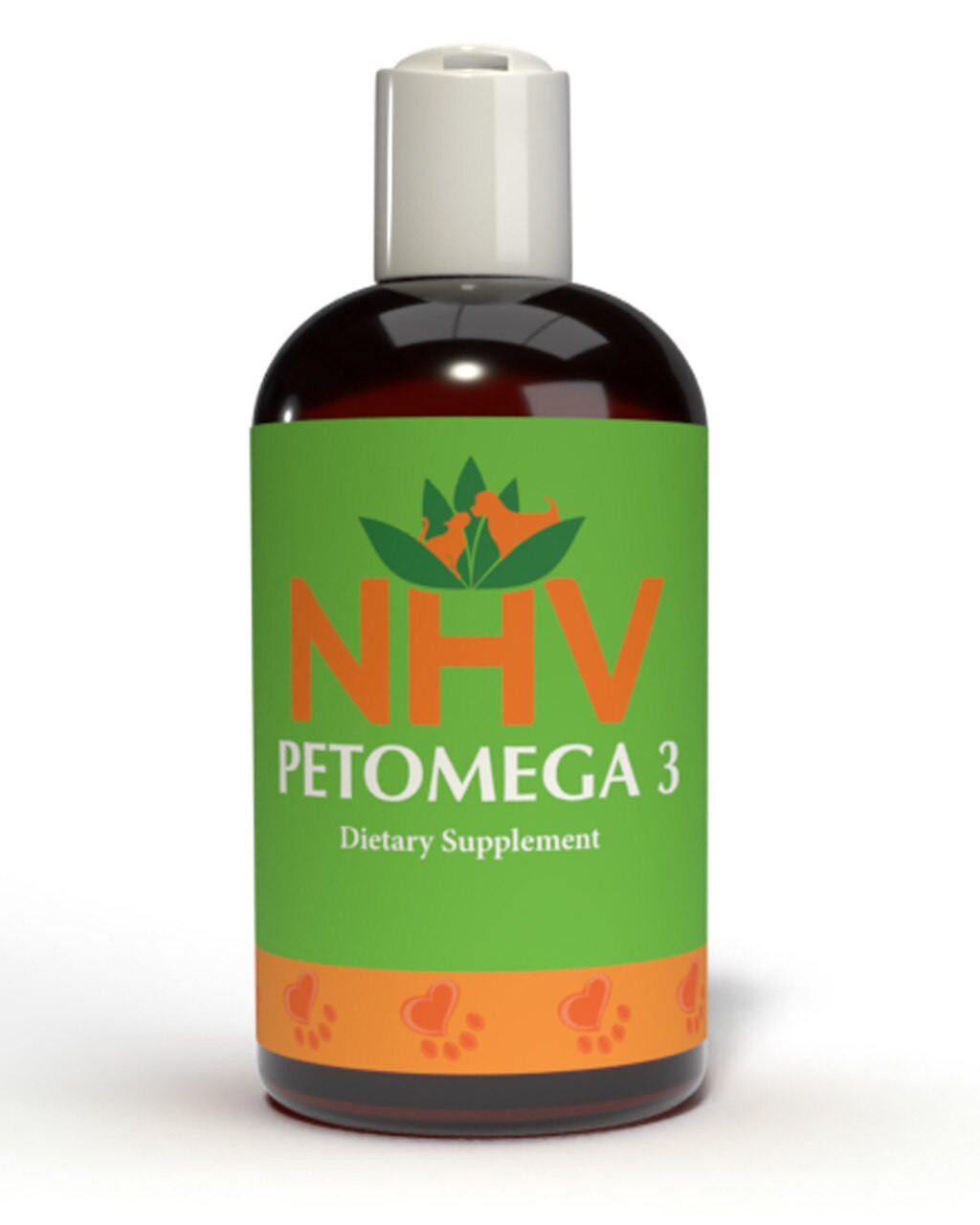
For Overall Health and Well-Being
buy 2 and save $3
Support your dog’s health with omega 3 fish oil for dogs. Help them maintain a healthy coat, eyes, joints, immune system and overall organ function.


Support your dog’s health with omega 3 fish oil for dogs. Help them maintain a healthy coat, eyes, joints, immune system and overall organ function.

Our omega 3 fish oil for dogs is a great source of EPA (Eicosapentaenoic Acid 600mg) and DHA (Docosahexaenoic acid 460mg) essential fatty acids. This fish oil supplement for dogs is derived from sardines, anchovies and North Atlantic cod liver oil. It is molecularly distilled and cold pressed to improve the bioavailability of the omega 3 fatty acids, and is medical and human grade quality.
Omega 3 fish oil for dogs may be beneficial for the following:
Processed pet foods have increased omega-6 fatty acids, and decreased omega-3 fatty acids. The University of Maryland Medical Center states, "It is very important to maintain a balance between omega-3 and omega-6 fatty acids in the diet. A proper balance helps maintain and even improve health." Your dog’s body cannot easily make essential fatty acids. It is vital to provide omega 3 fish oil for dogs as an added supplement to your pet’s daily diet.
The American Journal of Veterinary Medicine has published studies on the benefits of omega 3 fatty acids (fish oils) for arthritis and degenerative joint disease in dogs. The studies showed that dogs who were given omega 3 fatty acids had a significantly improved ability to get up from a resting position and marked improvement in walking ability.
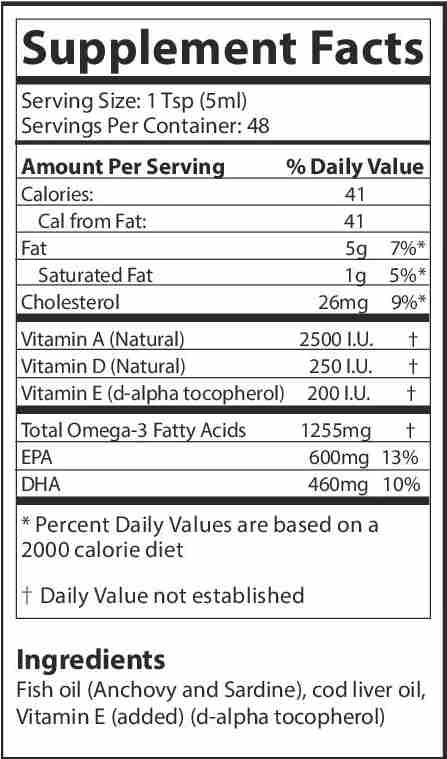
Suggested Dosage: To be taken once per day. Add to food based on weight chart.
Therapeutic Dosage: Double the quantity for maximum period of 4 weeks or follow veterinarian advise.
Pet’s Weight Dosage
0-15 lb = ¼ tsp
15-30 lb = ½ tsp
30-60 lb = 1 tsp
60-90 lb = 1 ½ tsp
How to Administer: Shake well before use. The easiest method is to add the dosage to your pets food. Some pets can be finicky, if this occurs consider hiding the appropriate amount in food most pet’s love such as fish, chicken, yogurt, or a favorite treat. If your pet only eats dry food then soak kibbles at feeding time.
For Best Results
Dietary supplements are beneficial to the health and well-being of your pet and are safe for long-term use. Every pet responds to natural supplements differently, therefore it is important to be consistent and administer the product daily. Supplements generally take two to four weeks to take effect, however this will vary from one animal to the next.
Product Storage
All NHV Natural Pet Products contain no artificial additives, preservatives or coloring. Shelf life after opening is 6 months and must be refrigerated after opening.
Cautions and Contraindications
Avoid During Pregnancy.
Our omega 3 fish oil for dogs is a great source of EPA (Eicosapentaenoic Acid 600mg) and DHA (Docosahexaenoic acid 460mg) essential fatty acids. This fish oil supplement for dogs is derived from sardines, anchovies and North Atlantic cod liver oil. It is molecularly distilled and cold pressed to improve the bioavailability of the omega 3 fatty acids, and is medical and human grade quality.
Omega 3 fish oil for dogs may be beneficial for the following:
Processed pet foods have increased omega-6 fatty acids, and decreased omega-3 fatty acids. The University of Maryland Medical Center states, "It is very important to maintain a balance between omega-3 and omega-6 fatty acids in the diet. A proper balance helps maintain and even improve health." Your dog’s body cannot easily make essential fatty acids. It is vital to provide omega 3 fish oil for dogs as an added supplement to your pet’s daily diet.
The American Journal of Veterinary Medicine has published studies on the benefits of omega 3 fatty acids (fish oils) for arthritis and degenerative joint disease in dogs. The studies showed that dogs who were given omega 3 fatty acids had a significantly improved ability to get up from a resting position and marked improvement in walking ability.

Suggested Dosage: To be taken once per day. Add to food based on weight chart.
Therapeutic Dosage: Double the quantity for maximum period of 4 weeks or follow veterinarian advise.
Pet’s Weight Dosage
0-15 lb = ¼ tsp
15-30 lb = ½ tsp
30-60 lb = 1 tsp
60-90 lb = 1 ½ tsp
How to Administer: Shake well before use. The easiest method is to add the dosage to your pets food. Some pets can be finicky, if this occurs consider hiding the appropriate amount in food most pet’s love such as fish, chicken, yogurt, or a favorite treat. If your pet only eats dry food then soak kibbles at feeding time.
For Best Results
Dietary supplements are beneficial to the health and well-being of your pet and are safe for long-term use. Every pet responds to natural supplements differently, therefore it is important to be consistent and administer the product daily. Supplements generally take two to four weeks to take effect, however this will vary from one animal to the next.
Product Storage
All NHV Natural Pet Products contain no artificial additives, preservatives or coloring. Shelf life after opening is 6 months and must be refrigerated after opening.
Cautions and Contraindications
Avoid During Pregnancy.
Published: October 5, 2022